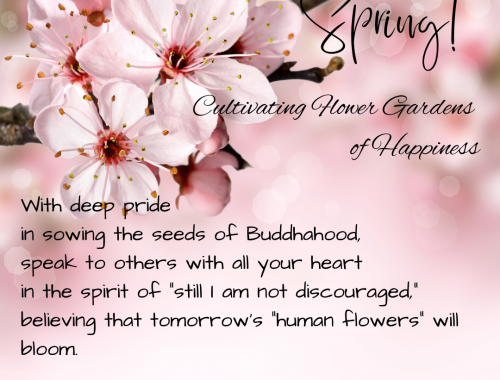
The Problem to Be Pondered Night and Day
Soka Gakkai Nichiren Buddhism Library
The second volume of the Lotus Sutra of the Wonderful Law states: “If a person fails to have faith but instead slanders this sutra . . . or on seeing those who read, recite, copy, and uphold this sutra, should despise, hate, envy, or bear grudges against them . . . When his life comes to an end he will enter the Avīchi hell . . . He will keep repeating this cycle for a countless number of kalpas.”1 The seventh volume reads, “For a thousand kalpas [they underwent great suffering] in the Avīchi hell.”2 The third volume mentions [those who wandered in the evil paths for] major world system dust particle kalpas, and the sixth volume refers to [those who were submerged in the realm of suffering for] numberless major world system dust particle kalpas. The Nirvana Sutra states, “Even if you are killed by a mad elephant, you will not fall into the three evil paths. But if you are killed by an evil friend, you are certain to fall into them.”
The Treatise on the Treasure Vehicle of Buddhahood by Bodhisattva Sāramati reads: “Those who are ignorant and unable to believe in the correct teaching, who hold false views and are arrogant, suffer such hindrances in retribution for the slanders of their past lives. They cling to incomplete doctrines and are attached to receiving alms and being treated with deference; they recognize only false doctrines, distance themselves from good friends, approach with familiarity such slanderers who delight in attachment to the teachings of the lesser vehicle, and do not believe in the great vehicle. Therefore they slander the Law of the Buddhas.
“A person of wisdom should not fear enemy households, snakes, the poison of fire, the god Indra, the roll of thunder, attacks by swords and staves, or wild beasts such as tigers, wolves, and lions. For these can only destroy one’s life, but cannot cause one to fall into the Avīchi hell, which is truly terrifying. What one should fear is slander of the profound teaching as well as companions who are slanderers, for these will surely cause one to fall into the frightful Avīchi hell. Even if one befriends evil companions and with evil intent spills the Buddha’s blood, kills one’s own father and mother, takes the lives of many sages, disrupts the unity of the Buddhist Order, and destroys all one’s roots of goodness, if one fixes one’s mind on the correct teaching, one can free oneself from that place. But if there is someone who slanders the inconceivably profound teaching, that person will for immeasurable kalpas be unable to obtain emancipation. However, if there is one who can cause others to awaken to and take faith in a teaching such as this, then that person is their father and mother, and also their good friend. This is a person of wisdom. After the Thus Come One’s passing, that person corrects false views and perverse thoughts, and causes people to enter the true way. For that reason, he has pure faith in the three treasures, and his virtuous actions lead others to enlightenment.”
Bodhisattva Nāgārjuna states in his Treatise on the Discipline for Attaining Enlightenment: “The World-Honored One expounded five causes3 leading to the hell of incessant suffering. . . . But if, with respect to the profound teaching that one has yet to comprehend, one were to remain attached [to lesser teachings and declare that this is not the Buddha’s teaching], then the accumulated sins of all the above-mentioned five acts would not amount to even a hundredth part of this offense.”
A wise person, while dwelling in security, anticipates danger; a perverse one, while dwelling amid danger, takes security for granted. A great fire fears even a small quantity of water, and a large tree may have its branches broken by even a small bird. What a wise person fears is slander of the great vehicle. It was on this account that Bodhisattva Vasubandhu declared that he would cut out his tongue,4 Bodhisattva Ashvaghosha implored that his own head be cut off,5 and the Great Teacher Chi-tsang made a bridge of his own body.6 The Tripitaka Master Hsüan-tsang traveled to the sacred land of India to discern [which teaching represents the truth], the Tripitaka Master Pu-k’ung likewise returned to India to resolve his doubts,7 and the Great Teacher Dengyō sought confirmation in China. Did not these men act this way in order to protect the true meaning of the sutras and treatises?
In Japan today, among the four kinds of believers of the eight schools as well as of the Pure Land and Zen schools, from the emperor and the retired emperor on down to their vassals and the common people, there is not a single person who is not a latter-day disciple or lay supporter of one of the three great teachers: Kōbō, Jikaku, and Chishō. Ennin, also known as the Great Teacher Jikaku, stated, “[Even though the Flower Garland and other sutras are termed ‘esoteric,’ they do not fully expound the secret teaching of the Thus Come One]; therefore, they differ [from the True Word teachings].”8 Enchin, also known as the Great Teacher Chishō, said, “When compared with the Mahāvairochana Sutra, the Flower Garland and Lotus are mere childish theory.”9 Kūkai, the Great Teacher Kōbō, remarked, “[Each vehicle that is put forward is claimed to be the vehicle of Buddhahood, but] when examined from a later stage, they are all seen to be mere childish theory.”10
Thus all three of these great teachers held that, though the Lotus Sutra is foremost among all the sutras that Shakyamuni Buddha “has preached, now preaches, and will preach,” when compared with the Mahāvairochana Sutra11 it is a doctrine of childish theory. Should any thinking person give credence to this assertion? A hundred, thousand, ten thousand, million times more than mad elephants, vicious horses, fierce bulls, savage dogs, poisonous snakes, poisonous thorns, treacherous bluffs, steep cliffs, floods, evil men, evil countries, evil towns, evil dwellings, evil wives, wicked children, and malicious retainers, the people of Japan today should fear those high-ranking priests who keep the precepts and yet hold distorted views!
Question: Are you suggesting that the three great teachers mentioned above were slanderers of the Law? Enchō, the Great Teacher Jakkō, the second chief priest of Mount Hiei; the Great Teacher Kōjō, superintendent of the temple; An’ne, the Great Teacher Daigyō; the Reverend Eryō;12 the Reverend Annen; the Supervisor of Priests Jōkan;13 the Administrator of Priests Danna; the sage of former times Eshin and several hundred others [of the Tendai school], as well as several hundred of Kōbō’s disciples including Jitsue, Shinzei, and Shinga;14 and also the other great teachers and sages of former times of the eight schools and ten schools—all these men were like so many suns, moons, and stars appearing in succession. During the passage of four hundred years and more, not a single person among them has ever questioned this assertion [of the three great teachers]. In the light of what sort of wisdom do you criticize this?
In the light of the above points, this shows, my followers, that you had better cut short your sleep by night and curtail your leisure by day, and ponder this! You must not spend your lives in vain and regret it for ten thousand years to come.
With my deep respect,
Nichiren
The twenty-third day of the eighth month
To Toki
I have received one string of coins. I hope all those who are serious in their resolve will gather in one place and listen to this letter.
Background
This letter was written to Toki Jōnin, a learned and dedicated disciple who lived in Shimōsa Province. In it Nichiren Daishonin stresses the extreme seriousness of the offense of slander and also the importance of embracing the supreme Buddhist teaching. The letter is dated simply the twenty-third day of the eighth month, and though it is generally thought to have been written in the first year of Kenji (1275) at Minobu, no firm conclusion has been reached in this regard. Other opinions are that the Daishonin wrote it in 1276 or even in 1273 while he was still on Sado Island.
In the Daishonin’s teaching, rather than adherence to a specific code of conduct, one’s fundamental posture toward the Mystic Law, or ultimate reality, determines one’s happiness or unhappiness in life. A person who seeks and awakens to the ultimate truth within will attain enlightenment, while one who remains in ignorance of it or even slanders it will continue to be bound by suffering. Hence the Daishonin’s emphasis on exclusive commitment to the Lotus Sutra, which teaches the direct attainment of Buddhahood for all people.
In the last part of this letter, the Daishonin raises a question that had crossed many people’s minds: on the basis of what sort of insight does he dare to criticize such eminent teachers of the past as Kōbō, Jikaku, and Chishō? However, instead of answering this question directly, he simply says, “You had better cut short your sleep by night and curtail your leisure by day, and ponder this!” This passage, from which the letter takes its name, suggests that the most important task of our human existence is to seek out and uphold the correct teaching leading to enlightenment.




